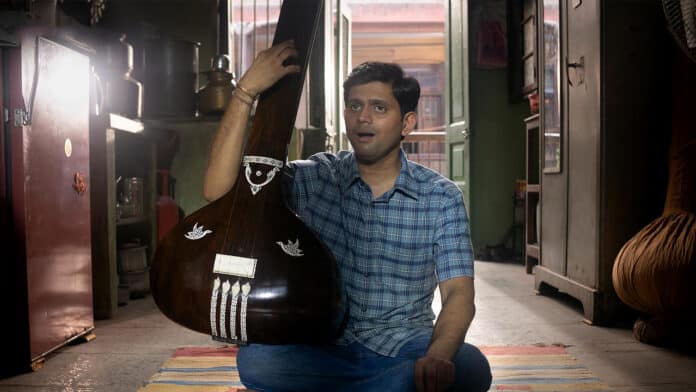‘The Disciple’ directed by Chaitanya Tamhane has released on Netflix. The film explores the tenets of North Indian classical music and the fate of its ardent practitioners, in an increasingly commercialised environment.
Sharad Nerulkar (Aditya Modak) is a sincere disciple of his Guruji (Arun Dravid), who is in inheritor of the Alwar Gharana lineage of classical music. Trained in singing by his father from childhood days, Sharad aims to live a life of committed classical learning and practise.
Sharad is inspired by his Guruji and the voice of ‘Maai’, a legendary maestro whose legacy is only held by a couple of recordings of her lectures that he possesses. He has come to see this form of music not merely as an impressive act of gimmick, but a lifelong quest to find the ultimate truth.
His family often finds itself in debt and pleads Sharad to find a ‘real’ job. His singing is often not received well in competitions. He seems to have an attraction for his fellow student Sneha, but his liking remains largely unrequited.
As portrayed in various scenes, Sharad observes that lesser singers with barely any commitment to the art make it big in commercialised television shows. With every passing day, his devastation worsens. What will the fate of the devoted practitioners of classical music be?
‘The Disciple’ ending explained in detail:
Guruji grows old and weary
Guruji is an aged man with health issues arising every now and then. Often facing lack of money, he borrows from acquaintances to pay the medicine bills. Sharad tries his best to manage and aid the finances.
In his prime days, he had refused to be diluted by concerts, audiences and the necessary crowd-pleasing that is required for the same. As days pass, it becomes increasingly difficult for Guruji to perform without succumbing to severe back pain. Nonetheless, he continues to perform in the dire need of finances.
His final performance is shown to be in a function to commemorate the late maestro they refer to as ‘Maai’.
Revelations and conflicts
Sharad sits down for a conversation with music researcher Rajan Joshi, whose writings and efforts at restoration he admires. The conversation takes a bitter turn when Joshi speaks irreverently of the teachers of Sharad’s lineage, including his guruji.
Joshi asserts that the popular opinions about legendary maestros are clouded with exaggeration and folklore, often missing the reality. He declares that he has heard that there exist some recordings of the lectures of ‘Maai’, but they are probably filled with self-righteous pretentious elitism. Enraged by the words, Sharad splashes a glass of water on Joshi’s face and leaves.
Other conflicts arise, with regard to what Sharad has come to see as dilution of music and popular gimmick. One of his students brings along his mother to Sharad’s classes, to let him know that he has been offered to sing for a college-level fusion band, and he will accept the offer if Sharad agrees.
Sharad responds saying that he can certainly accept the offer, but he won’t have to continue learning classical. He says that if a student is already lured by opportunities such as these, he will never develop the perseverance to devote to classical music.
An ending without conclusion
Eventually, Sharad launches a company by the name of ‘Anhad Sounds’ that aims to restore and publicise lost recordings of classical musicians. It also offers online articles and classes among other things. Sharad is shown to have married and been blessed with a daughter.
The conflicts that classical music faces today still remain. A singer either lives a life similar to Sharad’s, with minimal recognition, or succumbs to gimmick.
The film ends as Sharad is seated in a local train, as a street singer hums a folk tune walking down the coach towards the platform. His words address a ‘seeker’ as he walks away.
Also Read: Kathmandu Connection ending explained: Samarth’s past

